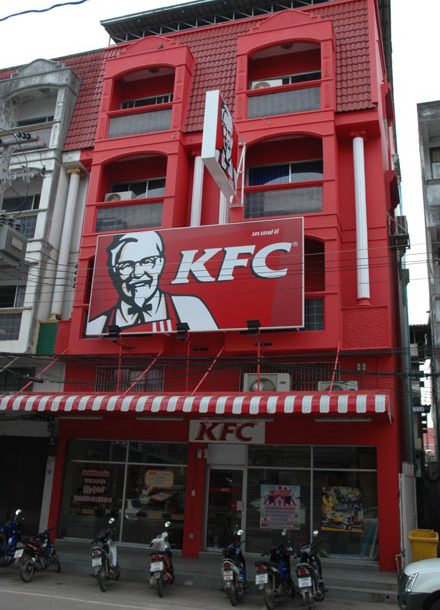There is a report today that Myanmar will soon have its first KFC store. It follows the first Swensen’s, Pizza Company and Lotteria outlets: all have opened in recent years. And they are all wildly popular.
Long-time New Mandala readers know that I have offered occasional musings on the topic of fast food in Southeast Asia for many years, going right back to when downtown Yangon had its own “fake” McDonalds. As I suggested back then, in August 2006, the fakes were on borrowed time:
I assume that when the Golden Arches finally makes its Burma push (which would be one obvious outcome of lifting US sanctions) these restaurants will go the way of the fake cognac and agricultural fungicide. They will get better, get legal or disappear.
History shows that they struggled to survive and in recent years the imitation fast food joints of Yangon have run out of steam. Unless I’m mistaken, they are all gone now.
Replacing them are the heavies of the regional and global burger scenes, with new stores from major chains opening in Yangon, Naypyitaw and Mandalay on a regular basis. When I was interviewed on the topic by The Myanmar Times in 2013 here’s what I had to say:
The arrival of the global fast food heavyweights marks a turning point for supply chains, middle class waistlines and international perceptions. Many will resent the arrival of such unhealthy harbingers of Western ways. But there will still be a level of excitement as some of the most recognisable brands and recipes in history sweep across the country.
Such developments will be bemoaned by those who prefer the Myanmar of quaint tea shops and curry houses. Those options will remain, I’m sure. My attitude is that the KFCs and McDonalds can’t be stopped and so we should endeavour to look for the advantages they could offer the Myanmar people.
In the case of the dominant global fast food players I would hazard to guess that there is significant potential upside, even for some of Myanmar’s marginal communities. In 2008 I touched on the social benefits that these burger giants can champion with smart hiring policies. As I wrote back then:
What intrigues me most about this KFC expansion into some of the poorer parts of Southeast Asia is inspired by a recent experience in Kolkata. Late one afternoon, after a stint in the distant mountains of northeast India, I went looking for a dose of the Colonel’s special herbs and spices.
I don’t want to get overly emotional about this but I was struck, and very impressed, by the fact that almost all of the staff at this particular KFC are deaf. The place worked perfectly; customers are expected to point out their order on a small menu, and then “the system” takes over. It is easy and simple and fast. And in a town as tough as Kolkata I imagine that the opportunities available to many deaf people are few. A job at KFC must, for some, be a lifeline and a chance to build a great future for their families.
Anyone who wants to read more about this approach to KFC staffing can learn more in these pieces (from Malaysia, Singapore, Pakistan and Egypt). It is clear that this is company policy – they want to hire people from a traditionally disadvantaged section of society. From what I saw of the KFC in Kolkata this is a simple, yet brilliant, idea. And, according to these accounts from around the world, it works well for everyone. In my case, the “Colonel’s Choice Burger” was fresh, and the customer service was top-notch. The server even tried to “suggestive sell”.
I wonder if this approach to staffing will be on the menu as the KFC brand is introduced to places like Phnom Penh, Vientiane, Yangon and Mandalay. Training people to run a KFC, and exposing them to all of its good points, and flaws, is one thing. It is a very different thing to deliberately seek out a highly competent yet disadvantaged part of society to be at the heart of a new business.
I haven’t seen any indication that KFC is seeking to take this hiring policy to Myanmar, but I can see no reason why they shouldn’t. Many New Mandala readers will have been in markets, in Thailand or Myanmar or elsewhere, where store-holder after store-holder is deaf and communicates with sign language and a well-developed arsenal of easily understood, but silent, sales pitches.
I think KFC in Myanmar could make quite a name for itself by looking to support some of the country’s marginalised young people with jobs in its new stores. I, for one, would delight in spending my kyat with any business that does its best to hire people who might otherwise miss out.
 Facebook
Facebook  Twitter
Twitter  Soundcloud
Soundcloud  Youtube
Youtube  Rss
Rss 